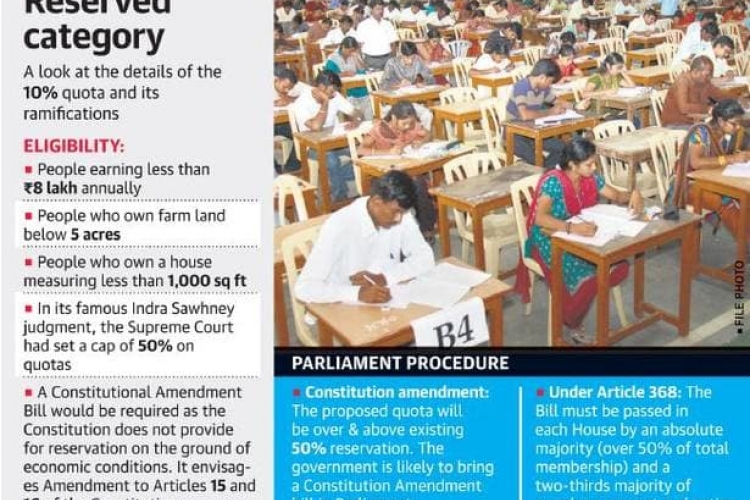Reservation in general category
In news
The Union Cabinet approved a Constitution Amendment Bill to provide 10% reservation to economically backward sections in the general category. The Bill will also cover those from the Muslim, Sikh, Christian, Buddhist and other minority communities. The quota will be over and above the existing 50% reservation to Scheduled Castes, Scheduled Tribes and Other Backward Classes (OBC).The reservation is for those castes who presently do not avail reservation in any category.
ABOUT THE BILL
The proposed quota is aimed at reserving 10 percent of government jobs through direct recruitment and seats in higher education institutions for economically backward upper sections of upper castes. The documentation however is likely to refer to this section as those who are 'not covered by existing schemes of reservations' or as members of the 'general category' or 'open category' or 'non-reserved', rather than as 'upper castes'.
2. The new quota would also cover economically backward members of upper castes of other religions. While faiths like Islam, Christianity, Buddhism and Sikhism are scripturally egalitarian in character, some converts in the Indian context have continued to retain their caste identities, leading to caste-based distinction within religions that do not traditionally have them.
3. The 'economically backward' tag would be applicable to 'upper caste' members who have an annual income below Rs 8 lakh, own less than five hectares of agricultural land, own homes smaller than 1,000 sqft, own residential plots below 100 square yards in notified municipalities or 200 square yards in non-notified municipality areas. Not meeting the requirement on even one of these factors could disqualify from eligibility for the quota.
4.The new quota would be implemented in a '50+10' formula, taking total reservation past the 50 percent cap placed by the Supreme Court in 1992. The court had struck down a similar notice in Indra Sawhney Etc. Etc vs Union Of India And Others, Etc.
LIKELY BENEFICIARIES FROM THE PROPOSED BILL
Among the major castes to benefit from the proposed law are Brahmins, Rajputs (Thakurs), Jats, Marathas, Bhumihars, several trading castes, Kapus and Kammas among other Upper Castes.The poor among the other religions will also benefit from it.
Process for implementation:
- Govt plans to introduce a constitutional amendment bill tomorrow, the last day of the Winter Session.
- Constitution envisages quota for socially and educationally backward classes besides SC and STs, but has no mention of economically weaker section .
- The amendment bill seeks to insert a clause in Sections 15 and 16 of the Constitution .
- Government requires support from at least two-thirds of the members in both the Houses to amend the Constitution.
- The quota will be over and above the existing 50 per cent reservation to SCs, STs and OBCs
According to the 2011 census, the population of the country was 1.21 billion. The population of the Scheduled Castes was 201.4 million and that of the Scheduled Tribes stood at 104.3 million. The proposed reservation will be over and above the existing 50 per cent reservation enjoyed by the Scheduled Castes, Scheduled Tribes and the Other Backward Classes, taking the total reservation to 60 per cent.
The constitutional amendment bill seeks to insert a clause in Articles 15 and 16 of the Constitution, introducing reservation for economically weaker sections in educational institutions and government jobs. A nine-judge Constitutional Bench of the Supreme Court had in the Indira Sawhney case capped the reservation at 50%.
The court had ruled on November 16, 1992, that “clause (4) of Article 16 of Constitution speaks of adequate representation and not proportionate representation” and “relaxation can be done in extra-ordinary situations and while doing so, extreme caution has to be exercised and a special case made out.”
In its famous Indra Sawhney judgement, the Supreme Court had set a 50 per cent cap on quotas. The proposed constitutional amendment will pave the way for the additional quota.The reservation will be given to those economically weaker people who presently do not avail any benefits of reservation.
The apex court has also asserted that the Constitution makes no case for quota on economic ground and only talks of educational and social backwardness besides those for the SCs and STs.
Criticism of the bill
The Constitutional amendments are likely to make changes that would specifically address the 1992 Supreme Court judgement, considering this matter can be expected to come up for judicial scrutiny again. Likely changes, among other appropriate steps, include the insertion of the word 'economically' in Clause (4) of Article 15. Another critical amendment would be to change the language of Clause (4) of Article to 16 to negate the Supreme Court's "irresistible conclusion" in 1992 that reservations "should not exceed 50%". The move is a massive rearrangement and recharacterisation of India's reservation. Some pointed out that in the existing scheme of things, reservations on the basis of economic backwardness do not have a place in the Constitution. Others argued that the idea of reservations was meant to be affirmative action in favour of historically marginalised, oppressed and disadvantaged communities that were denied the opportunity to accrue social capital, irrespective of economic standing.


 IAS -2025 Prelims Combined Mains Batch - III Starts - 14-04-2024
IAS -2025 Prelims Combined Mains Batch - III Starts - 14-04-2024